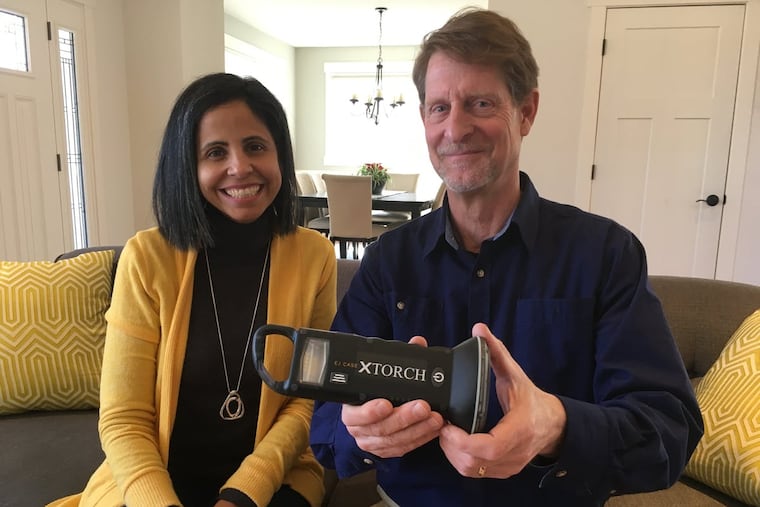Minnesota couple lights the way for families in need around the world
Keidy and Gene Palusky invested thousands to develop the XTorch after seeing a need for a reliable light and electricity source on mission trips.

Minneapolis real estate entrepreneur Gene Palusky and his schoolteacher wife, Keidy, are using their business acumen and big hearts to light dark corners of the globe.
Palusky, 64, a once-struggling artist, started renovating old houses 30-plus years ago. That led to an apartment building redevelopment business. He liquidated the last of the buildings several years ago.
“I don’t need another million dollars,” he said. “I have everything I want and enough for the rest of my life.”
Palusky and his wife, a native of the Dominican Republic, met years ago when he worked as a carpenter on a mission trip to the Dominican Republic. They live with their two children in a comfortable house in an old neighborhood in Edina, Minn.
Since 2015, the couple have invested hundreds of thousands of dollars in a business endeavor that’s helping students and low-income families in the Dominican Republic, Haiti, and elsewhere achieve nighttime lighting and 24-hour communications, in partnership with grassroots nonprofit partners.
XTorch (xtorch.org) is a solar-powered flashlight, lantern, and cellphone charger. And it’s already a game-changer for hundreds for poor families around the globe.
The idea grew out of Palusky’s months-long service in the Dominican Republic building a community center and teaching English. He was struck by the warmth of the people as well as the country’s outage-prone electrical system.
Kids there, in Haiti, and elsewhere without evening electricity often study by dangerous kerosene lamps or candles, he said. Moreover, people in developing countries are reliant on cellphones for small business communication. Reliable light leads to greater literacy, safety, and self-sufficiency, he said.
XTorch achieved modest sales in 2018 before a breakout 2019.
The Paluskys sold 1,100-plus XTorches on their website and Amazon for up to $60 each. They’ve tapped the markets of campers and homeowners, too, who like a long-lasting solar-powered lamp that also charges an iPhone.
Those profitable sales and a significant cash donation by the Palusky family enabled them to ship in March through their nonprofit partners about 2,000 XTorches to Haiti and to the Venezuelan border with Colombia. The torches are distributed directly to client families through XTorch partners Compassion International and Bethany Christian Services.
“We have donated more than we have made in profit by a long shot, but now that we no longer need to invest in tooling and R&D for manufacturing, our profit margin should be much greater than last year,” Palusky said.
They also are donating nearly 1,000 solar panels to Haiti, he said.
“That means more light and power,” he said. “And they can sell some power to neighbors for 25 cents or so. That gives them a tiny business tool.”
More revenue from XTorches means more donations.
Buoyed by continued strong sales and continuing demand, the Paluskys are hiring people with marketing skills and are venturing into selling through brick-and-mortar retailers.
Last year, a mother in Dominican Republic wrote to Keidy Palusky: ‘‘Besides saving money by not having to buy candles … my children can do their homework at night … it helps me to make dinner and, as an added bonus, I can charge my phone.”
‘‘This is turning out to be so much more work than we ever imagined,’’ Keidy said. “It has been five years since we started and are only now profitable. It seems to be working and we hope to grow sales about 350% in 2020. If we did not see the value in these efforts, we would not be doing it.’’